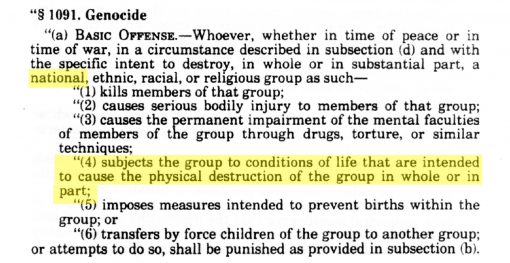U.S. Public Law 100-606
November 4, 1988: 18 U.S. Code § 1091.Genocide

November 4, 1988: 18 U.S. Code § 1091.Genocide

(a) Basic Offense.—Whoever, whether in time of peace or in time of war and with the specific intent to destroy, in whole or in substantial part, a national, ethnic, racial, or religious group as such—
(1) kills members of that group;
(2) causes serious bodily injury to members of that group;
(3) causes the permanent impairment of the mental faculties of members of the group through drugs, torture, or similar techniques;
(4) subjects the group to conditions of life that are intended to cause the physical destruction of the group in whole or in part;
(5) imposes measures intended to prevent births within the group; or
(6) transfers by force children of the group to another group;
shall be punished as provided in subsection (b).
(b) Punishment for Basic Offense.—The punishment for an offense under subsection (a) is—
(1) in the case of an offense under subsection (a)(1), where death results, by death or imprisonment for life and a fine of not more than $1,000,000, or both; and
(2) a fine of not more than $1,000,000 or imprisonment for not more than twenty years, or both, in any other case.
(c) Incitement Offense.—
(d) Attempt and Conspiracy.—
(e) Jurisdiction.—There is jurisdiction over the offenses described in subsections (a), (c), and (d) if—
(1) the offense is committed in whole or in part within the United States; or
(2) regardless of where the offense is committed, the alleged offender is—
(A) a national of the United States (as that term is defined in section 101 of the Immigration and Nationality Act(8 U.S.C. 1101));
(B) an alien lawfully admitted for permanent residence in the United States (as that term is defined in section 101 of the Immigration and Nationality Act (8 U.S.C. 1101));
(C) a stateless person whose habitual residence is in the United States; or
(D) present in the United States.
(f) Non applicability of Certain Limitations.—

Nation of Hawaii’s mission is to restore, maintain and preserve the sophisticated religion, language and culture of the Native Hawaiian people, who prior to the overthrow, lived in a highly organized, self-sufficient, subsistent social system based on Communal Land Tenure. (pre-mahele)